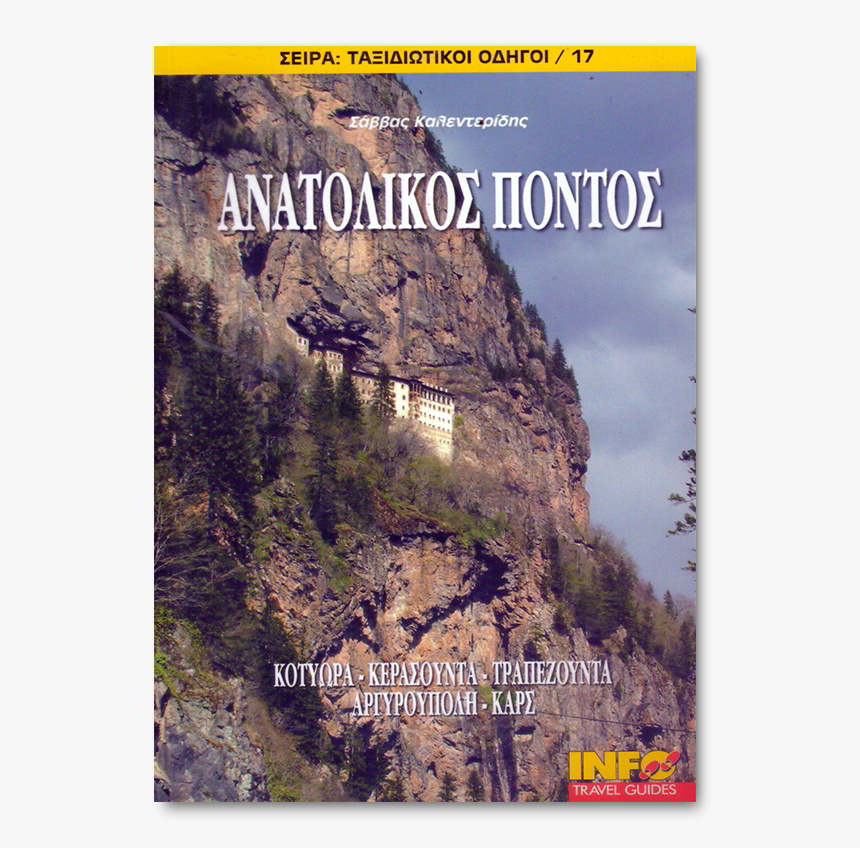Αρμενία - Αρμενικό Ζήτημα
Michael Rubin: Why Criticism of India’s Anti-Christian Bias Is False and Unfounded
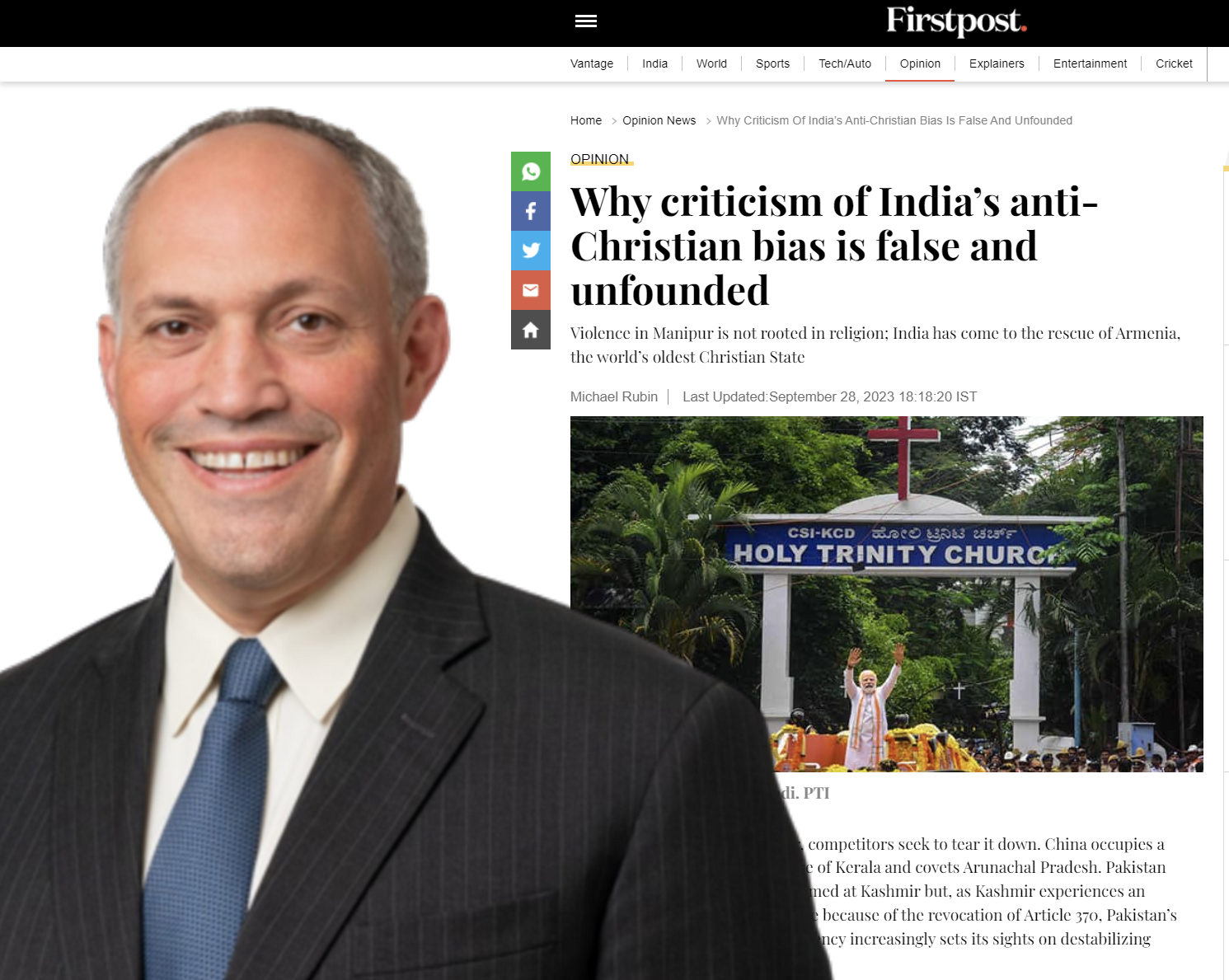
As India grows as a global power, competitors seek to tear it down. China occupies a portion of Ladakh roughly the size of Kerala and covets Arunachal Pradesh. Pakistan continues to sponsor terrorism aimed at Kashmir but, as Kashmir experiences an economic and political renaissance because of the revocation of Article 370, Pakistan’s Inter-Services Intelligence (ISI) agency increasingly sets its sights on destabilizing Punjab.
Not all adversaries use military means. Because India is not only the world’s largest democracy, but also among the world’s most diverse states linguistically, religiously, and ethnically, the country’s detractors find no shortage of domestic fault lines to exploit with cherry-picked facts and false narratives. Television cameras do not lie, but they also do not give a broad perspective.
Manipur’s violence was not rooted in religion
Take for example this past summer’s violence in Manipur. Outside of India, journalists who had never been to Manipur described the brief orgy of violence through a sectarian lens. Hindu nationalists, the propaganda went, were persecuting innocent Christians because of their religion. Such a narrative was as naïve as it was inaccurate.
Ethnic tension has simmered in Manipur for decades, often exacerbated by clumsy attempts by governments who, in the name of social justice, seek to privilege minorities rather than seek equal footing for all citizens under the law regardless of religion, sect, language, or ethnicity. Rather than win peace, this often breeds conflict. It is a moral hazard. Certainly, this has been the case with the many Manipur Christians whose Naga and Kuki clans the government listed as “scheduled tribes” since 1956, and who now seek to permanently enshrine their privilege relative to anyone else in the region.
Ethnic tension, some with secondary sectarian dimensions, is nothing new in the region. On 4 December, 1979, for example, the New York Times headlined an article, “India’s Christian Tribes Are Angered by Influx of Bengalis.” The difference in American reaction then and now may have more to do with the fact that prime minister Charan Singh was secular and Prime Minister Narendra Modi is religious. Americans, however, are not always aware of our biases.
Regardless, while Manipur is generally calm and peaceful, illegal immigration and drug smuggling occasionally undercut regional peace. This was the case this past summer. After the government introduced reform measures to make most residents equal under the law, some activists within the largely Christian Kuki tribe took to the streets in protest, fearing that bestowing the same rights on the largely Hindu Meitei group that the Kukis themselves enjoyed would constitute a threat. The influx of Kuki refugees fleeing Myanmar’s military crackdown added fuel to the fire, just as the influx of Palestinian refugees fleeing Jordan’s 1970 Black September crackdown sparked unrest in Lebanon as Palestinian refugees shifted that country’s delicate sectarian balance.
Adding to the perfect storm was India’s crackdown on opium cultivation. Many Kukis who fled Burma resumed opium cultivation on the Indian side of the border, and many Christians therefore benefited directly or indirectly from the trade. Local Christians may have been upset, but to stop drug cultivation and the heroin trade was no more anti-Christian in Manipur than opium eradication efforts were “Islamophobic” in Afghanistan.
None of this justifies subsequent violence. Some Kuki and Meitei burned each other’s houses and businesses. Kukis burned mosques while Meitei rioters targeted churches. The abuse perpetrated against some Kuki women is inexcusable. The Indian Supreme Court is correct to monitor the resulting criminal case as prosecutors seek to bring the perpetrators to justice.
While the crimes are inexcusable, the context by which they occurred is also important to understand (though not excuse) them: How can the Manipur violence be rooted in anti-Christian sentiment when rioters did not touch churches belonging to the Naga, the region’s other largely Christian ethnic group? This suggests the problem was never religion.
The vulnerability of all democracies to propaganda
Professional activists, some of whose funding is opaque or raise money through anonymous “Gofundme” donations that often seem to come directly or indirectly from a single country or its agents, sought to shape a narrative that Manipur proved that Modi was a Hindu nationalist bent on targeting Christians. Pieter Friedrich, a gadfly California-based activist, launched one of his frequent brief self-declared but never confirmed hunger strikes to demand Hindu politicians in the United States condemn anti-Christian repression. Most policymakers dismiss such cheap and dishonest theatrics. They realise their genesis is not in the suburbs of Sacramento or Vancouver but in Islamabad. Still, as activists throw mud at the wall to see what sticks, some dirt gets through, be it in news reports or even how the US. Commission on International Religious Freedom shapes some of the violence.
The need to absorb such cheap shots and inaccuracies by those prone to cherry-pick is just the price democracies pay. While polemicists argue systematic racism besets the United States, for example, they ignore that close to 90 per cent of African American murder victims are killed by other African Americans. Nor does the systematic racism canard explain the overrepresentation of Nigerian immigrants in medicine and on university faculties. The same narratives about Islamophobia also collapse in the face of data: American Muslims are on a per capita basis wealthier than the average American. FBI statistics regularly show Jews suffer hate crimes at more than five times the rate of Muslims. Regardless, counting 1,600 hate crimes in a country of over 30 crore people suggests not a country at war with itself, but rather one of tolerance.
India to the rescue of the world’s oldest Christian state
While India’s detractors cherry-pick and spread the calumny of systematic anti-Christian bias, the current government’s actions tell another story. Consider Armenia: The country’s historical importance as the world’s first Christian country, converted in 301 AD, is inversely proportional to its size: the entire country’s population is less than the city of Lucknow.
Armenians survived a genocide perpetrated by Ottoman Turks that killed more than one million. Unlike Germany’s Holocaust against the Jews, however, the perpetrating country—its successor Turkey [Türkiye]—refuses to acknowledge historical truth. That is bad enough, but in recent decades, it and its ally Azerbaijan have incited that genocide’s renewal. Azerbaijan faces no consequence for destroying one of the world’s oldest and largest Christian cemeteries at Julfa, a crime comparable to the Taliban’s destruction of the Bamiyan Buddhas, due to the cemeteries’ thousands of ancient and intricately carved cross-stones, all of which are now gone.
Both Turkey and Azerbaijan continue to blockade Armenia. The September 2020 attack by Azerbaijan and Turkey on the Armenian-populated region of Nagorno-Karabakh occurred on the 100th anniversary of the Ottoman invasion of the same territory. While many international leaders cite sovereignty issues to excuse Azerbaijani repressions of the Christians of Nagorno-Karabakh or, for that matter, Pakistan’s repression of Hindus, these territorial disputes are not the real problem. Azerbaijan’s leader claims the entirety of Armenia, including the capital Yerevan as Azerbaijani territory. In recent months, Azerbaijani troops have crossed Armenia’s recognized international frontiers.
Much of the world remains silent. Out of sheer anti-Christian animosity, Pakistan even refuses to recognize Armenia’s right to exist as a nation. British Petroleum (BP)’s lucrative contracts with Azerbaijan effectively silence the United Kingdom. Washington makes empty statements but stands aside as Azerbaijanis reportedly seize Armenian children and women in a replay of the Yezidi genocide. Every US president since George W. Bush up to Joe Biden even funds its persecutors.
India, however, is the exception. While the world ignores Armenia and aids its destruction, India is the country that sends it military goods to help Armenia defend itself from those who seek to eliminate the oldest Christian state. India may have some self-interest: as Turkey, Azerbaijan, Pakistan, and China seek to block in India, Armenia becomes the node by which India can access much of Eurasia. Indian engineers, medical doctors, and programmers collaborate with Armenia to jump-start the country’s economy, especially in the tech, pharmaceutical, and university spheres. Does this also benefit India? Yes, but that does not change the fact that India has come to the rescue of Christians whereas the United States, the United Kingdom, and Russia turn a blind eye and Pakistan, Azerbaijan, and Turkey cheer their demise.
It is fair to criticise Modi’s policies in the course of political debate. It is not fair, however, to slander a country that does more now to protect Christians in practice than those countries in which critics of India’s position toward Christianity now sit.
Source: First Post

Video
Η φωνή της Αρμενίας: Οι εξελίξεις επηρεάζουν την κοινή γνώμη

Η φωνή της Αρμενίας – Παρουσιάζει η Λιάνα Μανουκιάν
Ελληνόφωνο δελτίο ειδήσεων με την υποστήριξη της Δημόσιας Ραδιοφωνίας της Αρμενίας
Ενημέρωση στις 3 Οκτωβρίου 2024
Video
Η φωνή της Αρμενίας: Γιατί οι ΗΠΑ “σπρώχνουν” τους Τούρκους στον Καύκασο;
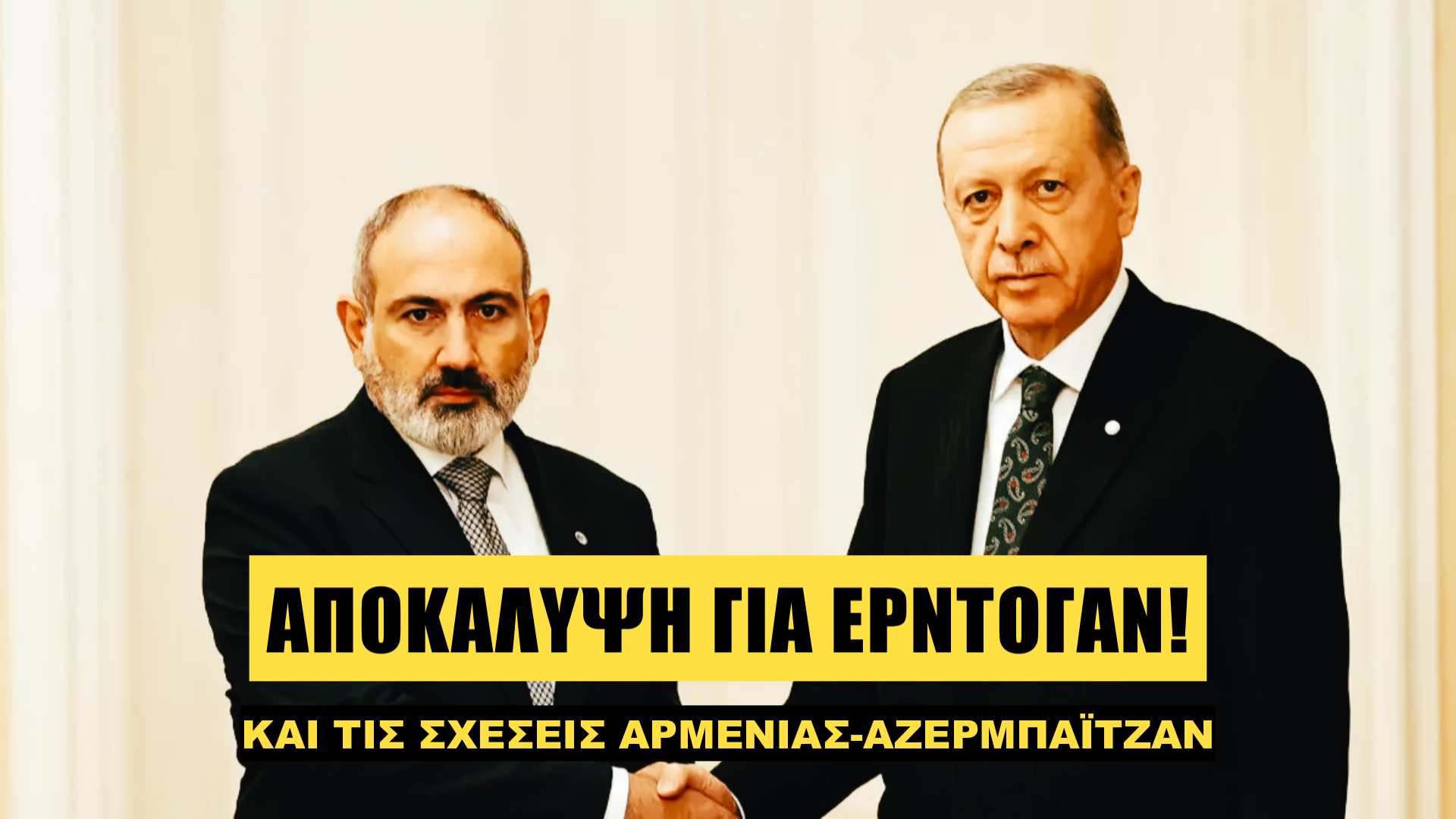
Η φωνή της Αρμενίας – Παρουσιάζει η Λιάνα Μανουκιάν
Ελληνόφωνο δελτίο ειδήσεων με την υποστήριξη της Δημόσιας Ραδιοφωνίας της Αρμενίας
Ενημέρωση στις 1 Οκτωβρίου 2024
Video
Η φωνή της Αρμενίας: Οι Ρώσοι θέλουν να κάνουν πραξικόπημα

Η φωνή της Αρμενίας – Παρουσιάζει η Λιάνα Μανουκιάν
Ελληνόφωνο δελτίο ειδήσεων με την υποστήριξη της Δημόσιας Ραδιοφωνίας της Αρμενίας
Ενημέρωση στις 27 Σεπτεμβρίου 2024
Το ρεπορτάζ
Πριν από λίγες ημέρες, η Δικαστική Επιτροπή ανέφερε σχετικά με την αποκάλυψη υπόθεσης προετοιμασίας για την αποτροπή της εξουσίας από την Εθνική Ασφάλεια: 3 άτομα συνελήφθησαν και 4 καταζητούνται. Σύμφωνα με τις αρχές επιβολής του νόμου, οι κάτοικοι της Αρμενίας και του Ναγκόρνο-Καραμπάχ στρατολογήθηκαν έναντι μηνιαίας αμοιβής 220 χιλιάδων ρωσικών ρουβλίων ο καθένας και μεταφέρθηκαν στη Ρωσία για τρίμηνη εκπαίδευση και κατά τη διάρκεια αυτής της περιόδου έπρεπε να εξοικειωθούν με τα νέα βαρέα όπλα. Έπρεπε να κατακτήσουν τις δεξιότητες χρήσης τους και μετά την επιστροφή τους στην Αρμενία να εκτελέσουν τα καθήκοντα μάχης, καθώς και να μεταδώσουν τις γνώσεις που απέκτησαν σε άλλους. Αξίζει να σημειωθεί ότι, σύμφωνα με την Δικαστική Επιτροπή, οι στρατολογηθέντες σε διάφορες ομάδες ταξίδεψαν στη ρωσική πόλη Ροστόφ επί του Ντον και στη συνέχεια μεταφέρθηκαν σε άλλη τοποθεσία, όπου υποβλήθηκαν σε προκαταρκτικό έλεγχο. Μετά την αρχική επιθεώρηση, στάλθηκαν σε μια στρατιωτική βάση που ονομάζεται «Αρμπάτ», μετά την οποία εκπαιδεύτηκαν να πολεμήσουν με γνωστά όπλα σε κλειστό χώρο, μέσα στο κτίριο. Σύμφωνα με την επιτροπή, οι στρατευμένοι ενημερώθηκαν ότι ο σκοπός της άσκησης ήταν να επιστρέψουν στην Αρμενία και να ανατρέψουν τη σημερινή κυβέρνηση, ζητώντας έτσι την κάθαρση και τη σωτηρία της Αρμενίας. Σε αυτό το φόντο, ο Αρχιεπίσκοπος Μπαγκράτ Γκαλστανιάν και οι πολιτικές δυνάμεις της αντιπολίτευσης δηλώνουν την πρόθεσή τους να κλιμακώσουν τον αγώνα της αντιπολίτευσης κατά του καθεστώτος από τις 2 Οκτωβρίου. Ο αναλυτής πολιτικών θεμάτων Στεπάν Γκριγκοριάν σχετικά με αν βλέπει κίνδυνο αποσταθεροποίησης στην Αρμενία είπε:
«Το Κρεμλίνο μισεί την κυβέρνηση του Πασινιάν, βοηθά το Αζερμπαϊτζάν να επιτεθεί στην Αρμενία και δημιουργεί μια ασταθής κατάσταση μέσω φιλορωσικών δυνάμεων. Δοκίμασαν όλες αυτές τις μεθόδους, είδαν ότι δεν αποδίδουν, τώρα κάνουν αποφασιστικά βήματα, αλλά αυτές οι μέθοδοι δεν πέτυχαν. Η Ρωσία είναι επίσης απασχολημένη με την Ουκρανία. Εκτός αυτού, η κοινωνία μας καταλαβαίνει πολύ καλά, και είναι αδύνατο να την νικήσουμε, ειδικά μετά τον αναγκαστικό εκτοπισμό του Αρτσάχ. Ο κόσμος δεν ακολουθεί την φιλορωσική αντιπολίτευση. Δεν μπορώ να πω για τον συγκεκριμένο ένοπλο σχηματισμό, πόσο σοβαρός είναι, δεν είμαι ειδικός σε αυτό. Αλλά δεν έχω καμία αμφιβολία ότι η Ρωσική Ομοσπονδία θέλει να κάνει πραξικόπημα στην Αρμενία, ακόμα με το ζόρι». Ο αναλυτής επέμεινε ότι η κυβέρνηση της Αρμενίας πρέπει να λάβει προληπτικά μέτρα.
«Η Ρωσική Ομοσπονδία θέλει να χρησιμοποιήσει την ίδια μέθοδο που χρησιμοποιήθηκε στο Ναγκόρνο-Καραμπάχ, όταν είπε στις πρώην αρχές του Ναγκόρνο-Καραμπάχ να ανατρέψουν τον Αραΐκ Αρουτιουνιάν και να φέρουν τον διάδοχό τους, υποσχόμενοι, ότι θα τον υποστηρίξουν. Ωστόσο, εξαπάτησαν και έφεραν τον διάδοχο αλλά δεν τον υποστήριξαν. Ο Αραΐκ Χαρουτιουνιάν δεν ήθελε να παραιτηθεί. Η κατοικία του Αρουτιουνιάν δέχτηκε πυροβολισμούς. Ο Αραΐκ Αρουτιουνιάν αναγκάστηκε να παραιτηθεί. Τώρα με το ίδιο σενάριο θέλουν να κάνουν εδώ – στην Αρμενία.
Είμαι σίγουρος ότι μπορεί να γίνει απόπειρα πραξικοπήματος εκ μέρους της ΡΟ και αυτό δεν συζητιέται εδώ. Αλλά δεν υπάρχει αμφιβολία ότι δεν θα πετύχουν αυτό που θέλουν. Προσπάθησαν να ενισχύσουν τεχνητά την πολιτική αντιπολίτευση, αλλά αυτό δεν λειτούργησε. Ο κόσμος αντιλαμβάνεται ότι οι φιλορώσοι μας οδηγούν στην καταστροφή, μας οδηγούν στο καθεστώς της επαρχίας, γι’ αυτό και ο αριθμός των υποστηρικτών της ευρωπαϊκής ολοκλήρωσης έχει αυξηθεί δραματικά», δήλωσε ο Στεπάν Γκριγκοριάν.
Στην απόπειρα ένοπλου πραξικοπήματος συμμετείχαν ρωσικές ειδικές υπηρεσίες
Αφού οι αρμενικές αρχές επιβολής του νόμου ανακοίνωσαν ότι ανακάλυψαν και απέτρεψαν μια απόπειρα ένοπλου πραξικοπήματος στην Αρμενία, υπήρξαν εικασίες ότι οι ρωσικές ειδικές υπηρεσίες συμμετείχαν στην προετοιμασία του.
-
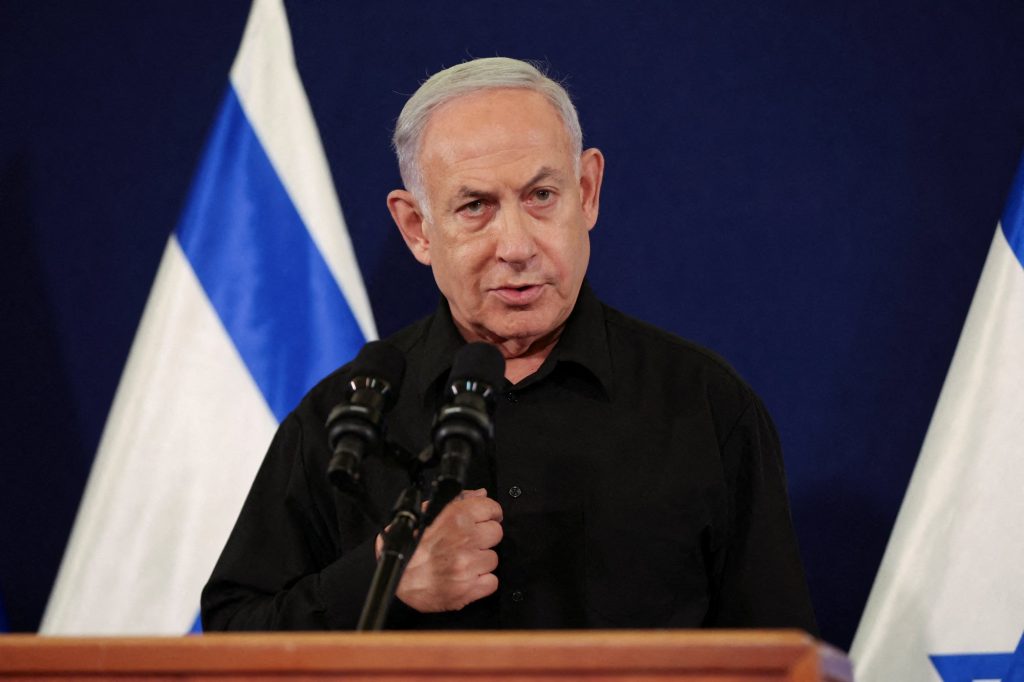
 Ιράν1 ημέρα πριν
Ιράν1 ημέρα πρινKίνηση υψηλού ρίσκου του Ισραήλ! Δεν αποκλείει χτύπημα στα πυρηνικά του Ιράν ο Νετανιάχου – Πότε θα χτυπήσει;
-

 Εξωτερική Πολιτική1 ημέρα πριν
Εξωτερική Πολιτική1 ημέρα πρινΣτο επίκεντρο η ελληνοαμερικανική συνεργασία σε συνάντηση του Μητσοτάκη με Αμερικανούς γερουσιαστές στα Χανιά
-

 Γενικά θέματα1 ημέρα πριν
Γενικά θέματα1 ημέρα πρινΜία νέα αρχή για το «Γεωπολιτικό»
-
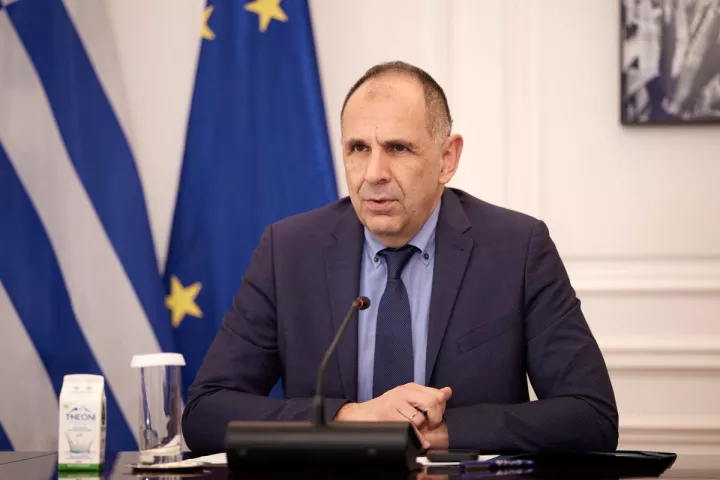
 Αναλύσεις - Γνώμες1 ημέρα πριν
Αναλύσεις - Γνώμες1 ημέρα πρινQuo vadis κύριε Γεραπετρίτη;
-

 Αστυνομία1 ημέρα πριν
Αστυνομία1 ημέρα πρινΑποκάλυψη! Ειδικό λογικό ισραηλινής κατασκευής για μαζική αναγνώριση προσώπων αποκτά η ΕΛ.ΑΣ
-

 Πολιτισμός1 ημέρα πριν
Πολιτισμός1 ημέρα πρινΒαθιά σιωπή! Θλίψη και πένθος – Έφυγε ο σπουδαίος Μίμης Πλέσσας λίγο πριν κλείσει τα 100
-

 Video9 ώρες πριν
Video9 ώρες πρινLive: Σε νέα φάση ο πόλεμος στη Μέση Ανατολή! Δύσκολες στιγμές για την ανθρωπότητα
-
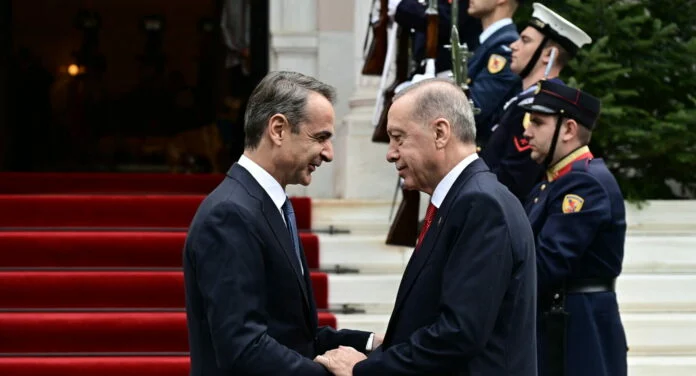
 Γενικά θέματα24 ώρες πριν
Γενικά θέματα24 ώρες πρινΤούρκος διπλωμάτης: «Η σιωπηλή συμφωνία Ερντογάν – Μητσοτάκη»



